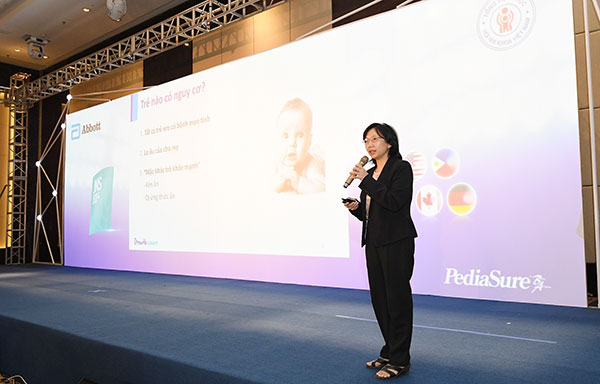Symposium for healthy growth of Vietnamese children
 |
Participants included leading experts from Singapore and Vietnam.
Addressing growth challenges of Vietnamese children
In recent years, although Vietnam has made impressive progress toward improving the health of children, the country still faces many challenges.
According to a research by Vietnam National Institute of Nutrition (NIN), the prevalence of stunted growth among children under the age of five in 2015 was 24.6 per cent, and that of underweight was 14.1 per cent. Another report by NIN shows that among Vietnamese children below five years of age, the rate of anaemia is 27.8 per cent, pre-clinical vitamin A deficiency is 13 per cent, and zinc deficiency is up to 69.4 per cent.
With the purpose of providing local paediatricians with the latest scientific information, measurement tools, and nutrition solutions to help them quickly detect and treat children at risk of nutrition gaps and growth issues, Vietnam Paediatric Association, in cooperation with global healthcare company Abbott, has held this symposium.
As a speaker at the symposium, Prof. Marion Margaret AW, Department of Paediatrics, National University of Singapore, said, “When a child is not growing well, it is critical to identify under-nutrition or malnutrition and intervene. Chronic malnutrition can result in higher risk of infections, as well as impair long-term health and growth. Stunting is one of the long-term consequences of under-nutrition.”
“Prompt and effective intervention can reduce long-term nutritional and developmental morbidity, support nutritionally at-risk children, optimise growth, cognitive development, and long-term health outcomes,” she added.
 |
Intervention for healthy growth and dietary diversity
A number of interventional studies of children at risk of undernourishment indicated that dietary counselling, combined with a complete and balanced oral nutritional supplementation are effective in improving micronutrient intake, which may be deficient in daily food consumption, and thereby improving children’s nutritional status and growth.
At the symposium, experts discussed how findings of the clinical study “Impact of long-term use of oral nutrition supplements on nutritional adequacy, dietary diversity, health outcomes, and longitudinal growth of children at risk of undernourishment” can help Vietnamese children to achieve healthy growth.
This is a 48-week intervention study, conducted on 199 children aged 3-4 who were at risk of undernourishment. These children received 450 kcal oral nutrition supplements daily and dietary counselling. The counselling provided guidelines about food groups, appropriate portion sizes, limiting high-sugar foods, and positive eating environments. The oral nutrition supplementation used in the study was PediaSure, a supplement designed and produced by Abbott Nutrition.
Researchers found that the children caught-up in growth after the first nine weeks of the intervention and after the first 16 weeks their dietary diversity score increased and the number of sick days reduced. After the 48 weeks, the intervention helped sustain normal growth after a catch-up growth for nutritionally at-risk children. Moreover, it increased consumption of a greater variety of foods, including fruits, vegetables, and protein-rich items.
PhD Li Fei from the R&D Department of APAC Abbott Nutrition, Singapore, another speaker of the symposium, highlighted, “Long-term use of oral nutrition supplements, such as PediaSure, helps promote dietary diversity, fills nutritional gaps, and improves overall nutrition status. It increases the intake of energy and key nutrients for growth, especially the key nutrients that are found deficient in many Asian children, such as calcium, iron, vitamins A and C. Meanwhile, long-term use of PediaSure does not lead to excessive weight gain and has no negative impact on the consumption of regular family foods.”
According to experts, an oral nutrition supplement like PediaSure has extremely beneficent impacts since it contains all essential macro- and micro- nutrients for growth and development, is easy to digest and absorb, and contains high-quality protein and adequate growth nutrients.
What the stars mean:
★ Poor ★ ★ Promising ★★★ Good ★★★★ Very good ★★★★★ Exceptional
Latest News
More News
- The generics industry: unlocking new growth drivers (February 04, 2026 | 17:39)
- Vietnam ready to increase purchases of US goods (February 04, 2026 | 15:55)
- Steel industry faces challenges in 2026 (February 03, 2026 | 17:20)
- State corporations poised to drive 2026 growth (February 03, 2026 | 13:58)
- Why high-tech talent will define Vietnam’s growth (February 02, 2026 | 10:47)
- FMCG resilience amid varying storms (February 02, 2026 | 10:00)
- Customs reforms strengthen business confidence, support trade growth (February 01, 2026 | 08:20)
- Vietnam and US to launch sixth trade negotiation round (January 30, 2026 | 15:19)
- Digital publishing emerges as key growth driver in Vietnam (January 30, 2026 | 10:59)
- EVN signs key contract for Tri An hydropower expansion (January 30, 2026 | 10:57)
















 Mobile Version
Mobile Version